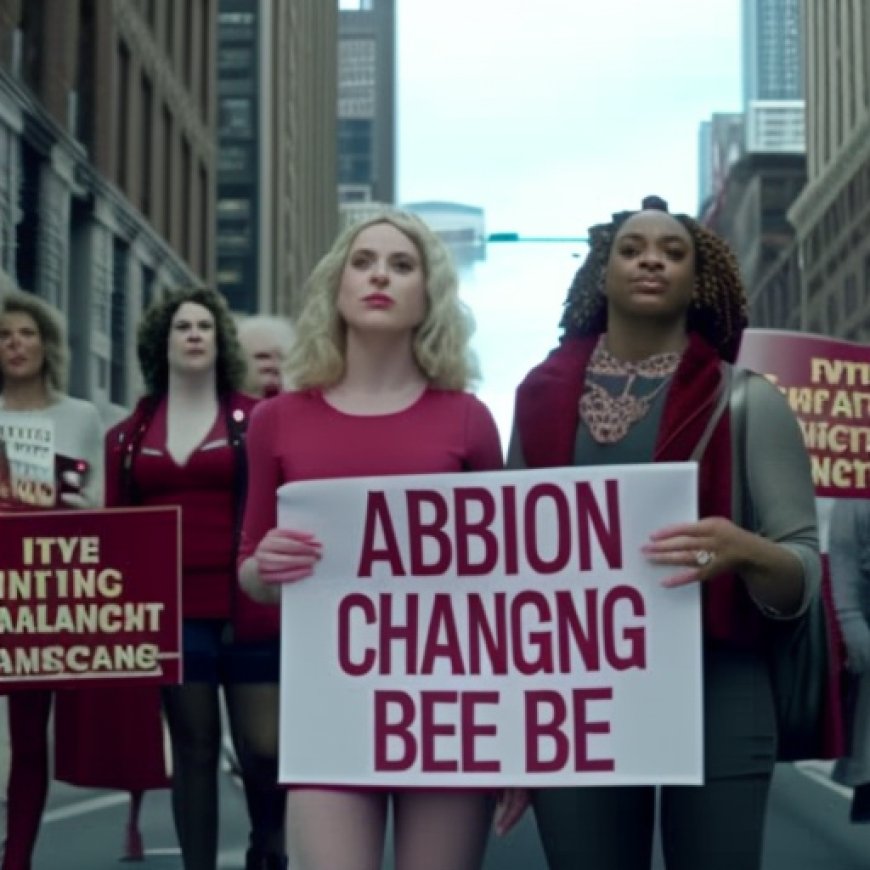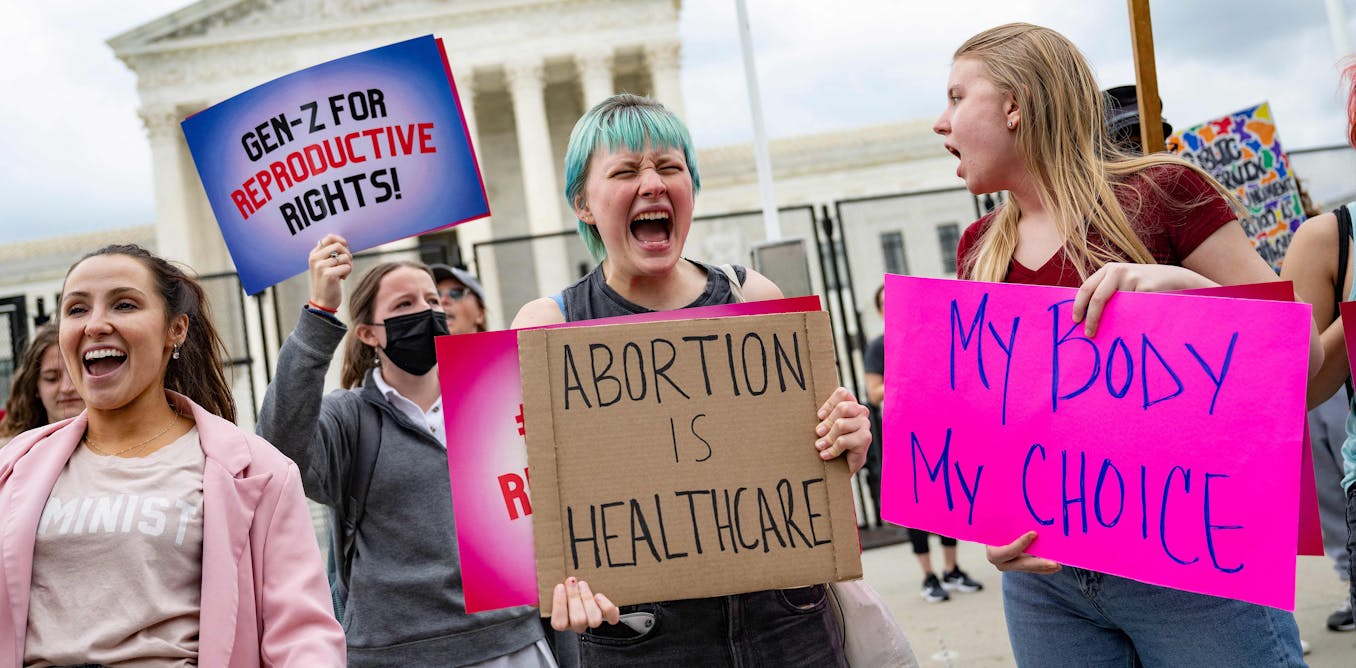Abortion bans are changing what it means to be young in America


Adolescence and Young Adulthood in the Post-Roe v. Wade Era: Implications for Sustainable Development Goals

Introduction
Adolescence and young adulthood is a time of identity formation, when young people figure out who they are and who they want to be. One of the ways they do this is by considering the world around them, paying attention to social issues and starting to understand their society and their place in it. Laws and policies signal to young people what society thinks of their value, their role in society, and their opportunities for the future. In the context of the Sustainable Development Goals (SDGs), it is crucial to examine how recent legal decisions, such as the overturning of the Roe v. Wade precedent in 2022, have impacted the experience of adolescence and young adulthood in America.
The Impact of the Dobbs Decision
Changing Perspectives
Following the Dobbs v. Jackson Supreme Court decision, more than half of U.S. adolescents, ages 13-19, now live in a state with severely restricted or no legal abortion access. This has led to what experts term an “era of rights retractions.” The implications of these abortion bans extend beyond those who need an abortion – they are shaping an entire generation.
Young People’s Views on the Dobbs Decision
A national survey conducted in 2022 revealed that the majority of young people between the ages of 14 to 24 are aware of and alarmed by the Dobbs decision and its implications. These restrictions on abortion access not only affect young people who become pregnant or seek an abortion but also impact their views on voting, where they choose to live, study, and work, as well as their mental health.
Implications for Sustainable Development Goals
Impact on Voting
As approximately 8 million young people become newly eligible to vote in 2024, their views on abortion rights play a significant role. Research shows that young people are the most likely to support abortion rights and consider it a top issue that motivates their voting decisions. Their votes can shape the 2024 election at both the national and state level, serving as a referendum on reproductive rights and influencing the representation they desire.
Considerations for College, Living, and Working
Abortion access is now a factor in decisions about where to attend college, live, and work. Over 70% of high school seniors reported considering reproductive health care access in their college decision. Additionally, two-thirds of young workers expressed a preference for not living in a state with abortion bans. This has led to an increased motivation among young women to move to another state if their current state has passed or would pass an abortion ban.
Managing Fertility
Following the Dobbs decision, young people’s access to contraceptive services is also changing. Recent rulings have limited confidential access to contraception for minors, raising concerns about further restrictions. Some young people have opted for permanent sterilization to avoid the risk of unintended pregnancies when comprehensive reproductive health care is not available or under threat.
Mental Health Implications
Emerging data suggests that mental health outcomes are worse in states with abortion bans. Women living in states with trigger abortion bans showed greater increases in symptoms of anxiety and depression after the Dobbs decision was announced. Excluding young people from research on abortion access and its consequences is a common occurrence, but it is important to recognize that the mental health consequences of reproductive health care restrictions may be more severe for historically marginalized populations, including young people.
Conclusion
The post-Roe v. Wade era has fundamentally changed the experience of adolescence and young adulthood in America. Abortion restrictions have wide-ranging implications for young people’s views, voting behavior, college decisions, living and working choices, fertility management, and mental health. It is crucial to address these issues in the context of the Sustainable Development Goals, particularly Goal 3 (Good Health and Well-being), Goal 4 (Quality Education), Goal 5 (Gender Equality), and Goal 10 (Reduced Inequalities). By recognizing the impact of abortion restrictions on young people, policymakers and stakeholders can work towards ensuring their rights, well-being, and opportunities for a sustainable future.
SDGs, Targets, and Indicators
-
SDG 3: Good Health and Well-being
- Target 3.7: By 2030, ensure universal access to sexual and reproductive healthcare services, including for family planning, information and education, and the integration of reproductive health into national strategies and programs.
- Indicator: Access to abortion services and contraception for young people.
-
SDG 4: Quality Education
- Target 4.7: By 2030, ensure that all learners acquire the knowledge and skills needed to promote sustainable development, including through education for sustainable development and sustainable lifestyles, human rights, gender equality, promotion of a culture of peace and non-violence, global citizenship, and appreciation of cultural diversity and of culture’s contribution to sustainable development.
- Indicator: Knowledge and awareness of the Dobbs decision and its implications among young people.
-
SDG 5: Gender Equality
- Target 5.6: Ensure universal access to sexual and reproductive health and reproductive rights as agreed in accordance with the Program of Action of the International Conference on Population and Development and the Beijing Platform for Action and the outcome documents of their review conferences.
- Indicator: Impact of abortion restrictions on young people’s mental health.
-
SDG 10: Reduced Inequalities
- Target 10.3: Ensure equal opportunity and reduce inequalities of outcome, including by eliminating discriminatory laws, policies, and practices and promoting appropriate legislation, policies, and action in this regard.
- Indicator: Impact of abortion restrictions on young people’s decision-making regarding college, work, and voting.
-
SDG 16: Peace, Justice, and Strong Institutions
- Target 16.3: Promote the rule of law at the national and international levels and ensure equal access to justice for all.
- Indicator: Era of rights retractions and the impact of the Dobbs decision on young people’s perception of their value, role in society, and opportunities for the future.
Table: SDGs, Targets, and Indicators
| SDGs | Targets | Indicators |
|---|---|---|
| SDG 3: Good Health and Well-being | Target 3.7: By 2030, ensure universal access to sexual and reproductive healthcare services, including for family planning, information and education, and the integration of reproductive health into national strategies and programs. | Access to abortion services and contraception for young people. |
| SDG 4: Quality Education | Target 4.7: By 2030, ensure that all learners acquire the knowledge and skills needed to promote sustainable development, including through education for sustainable development and sustainable lifestyles, human rights, gender equality, promotion of a culture of peace and non-violence, global citizenship, and appreciation of cultural diversity and of culture’s contribution to sustainable development. | Knowledge and awareness of the Dobbs decision and its implications among young people. |
| SDG 5: Gender Equality | Target 5.6: Ensure universal access to sexual and reproductive health and reproductive rights as agreed in accordance with the Program of Action of the International Conference on Population and Development and the Beijing Platform for Action and the outcome documents of their review conferences. | Impact of abortion restrictions on young people’s mental health. |
| SDG 10: Reduced Inequalities | Target 10.3: Ensure equal opportunity and reduce inequalities of outcome, including by eliminating discriminatory laws, policies, and practices and promoting appropriate legislation, policies, and action in this regard. | Impact of abortion restrictions on young people’s decision-making regarding college, work, and voting. |
| SDG 16: Peace, Justice, and Strong Institutions | Target 16.3: Promote the rule of law at the national and international levels and ensure equal access to justice for all. | Era of rights retractions and the impact of the Dobbs decision on young people’s perception of their value, role in society, and opportunities for the future. |
Source: theconversation.com








